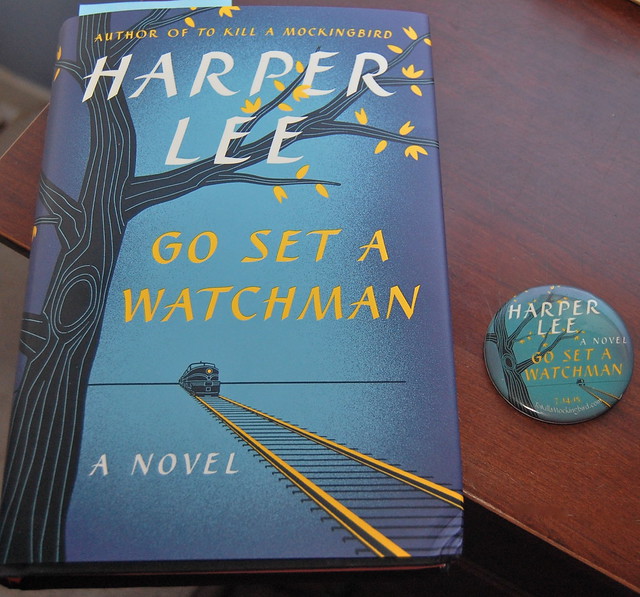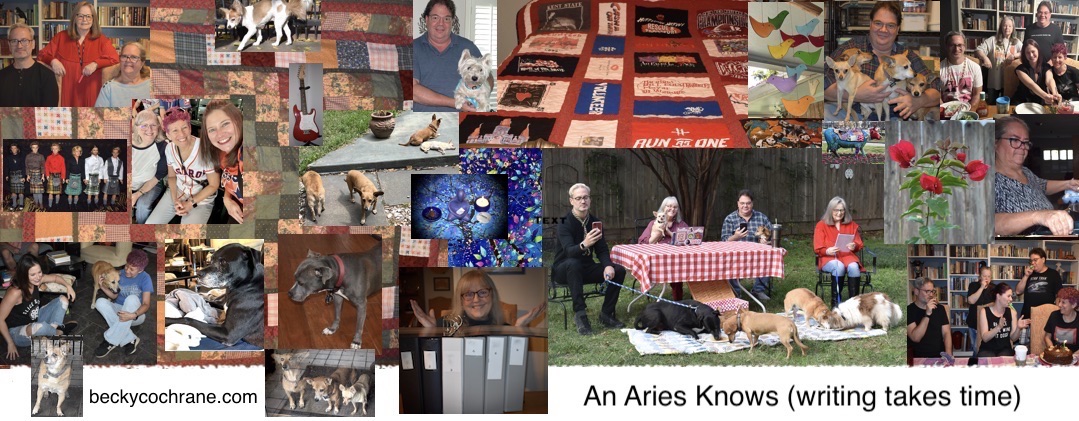
First, the button. The other day I was almost at my doctor’s office when I realized I had failed to bring something to read. There’s a Barnes & Noble one block away from the medical campus, so I detoured in with a very certain book in mind I wanted to buy. Unfortunately, they didn’t have the hardcover edition of that book, so I picked up the book that has everyone analyzing Southerners and the South again. (Note: How I would appreciate it if people stopped trying to explain us to ourselves. We know who we are, we accept our limitations, we laugh at our contradictions, and we are not all the same except in one thing: Whether or not we possess self-awareness and humor, we get tired of being told that our flaws can’t be found in the rest of you. They can. Welcome to the human race.)
So I bought Go Set A Watchman because as anyone who’s read this blog knows, I list To Kill a Mockingbird as probably my favorite of all books written. I also bought a couple of other items, one of which I had to return because I’d forgotten I already have it. When I went back to the store the following day, the person who helped me–I don’t know if she was a manager or a sales associate–was wearing this button. “I must have a button like that,” I said, and then we commenced to discussing the novel because she could see on my receipt that I’d purchased it. Then, as I was about to leave, she removed the button and said, “Here, you can have mine.” I hope I never stop being touched by such gestures. Thank you to her for proof that booksellers are among the best people, both in conversation and generosity.
Now: the novel, which I have read in its entirety. I do not think any of us can know the full truth about how this novel came to be found and published or if someone or multiple someones are abusing Harper Lee’s trust. But I do know a few things about writing and editing. I hope there are still literary writers who have editors like the one who helped Miss Lee develop To Kill a Mockingbird out of this alleged first draft. Legend has it that at one point she was so frustrated with her editor that she hurled the manuscript through a window. But if that is the novel that she drew from this one, her editor did her a wonderful turn, because she crafted a hauntingly beautiful story that still resonates with truths and gives us reason to believe that no matter how small and mean the world around us can be, and no matter how flawed we are, we can always rise up to the best in ourselves.
And this book–whether a sequel or a first draft–is a wonderful gift, as well, because it gives me a chance to ponder one of my favorite things–the reliability and complexity of narrator–and makes me remember that those things that make us uncomfortable in art tell us much more about ourselves than about the artist. For anyone creative, the joy should rightly be in creation. Whether that creation comforts the rest of us, challenges us, disturbs us, incites us, changes us, or leaves us indifferent–over these things, the artist lacks control.
I would need to read the novel again–probably multiple times–to explore its many layers examining classism, sexism, racism. It will be up to time to judge its literary merit, but I know that the woman who is reading this novel now is quite different from the girl who read To Kill a Mockingbird, and in that way, I must consider my own perspective as a reader just as I consider Scout at six, Scout at twenty-six, and Scout as the older woman who’s telling both their stories.

Look you get something on facebook and something here. It’s because I’m a giver … in fact some say …
I’m glad that you said something about the south and southerners being analyzed again … You know that I am a proud southern gal as you are … and I consider us both to be enlightened, right thinking compassionate folk who have a clear vision about our collective past as a region … etc…
What gets me all worked up is that so many people who haven’t lived here or experienced the south and truly know it speaking about the south its history, the implication of this that and the other …. Slavery racism etc is reflected in so much of our music, or literature etc … BUT we aren’t the only ones that have a checkered past, for instance, we din’t lock immigrant women and children, barely paying them to do unsafe work, in unsafe factories, making it impossible to get them out when the building caught on fire. Also I was a wee baby, however I do remember seeing some video on the nightly news that was horrifying when Boston desegregated its schools with bussing. Racism and bigotry exist everywhere.
I’m not romanticizing our past, it can be a complicated thing, but no more complicated than that of other regions.
I would like to read it – and will do at some point. I will probably re-read To Kill A Mockingbird first, though.
Tim is doing that now, too.